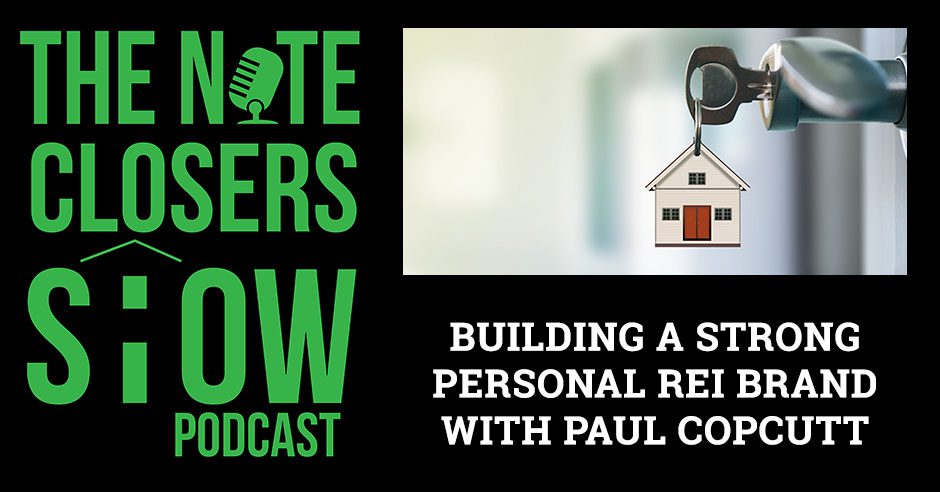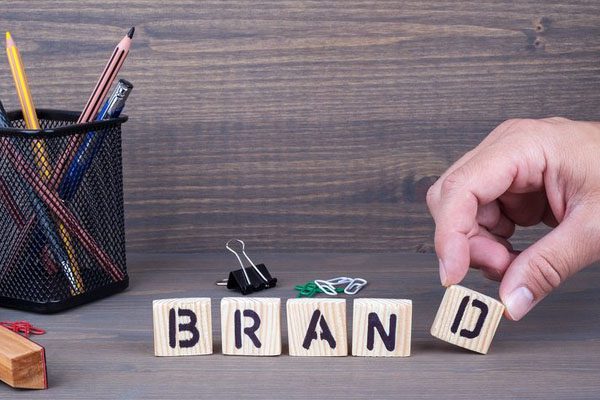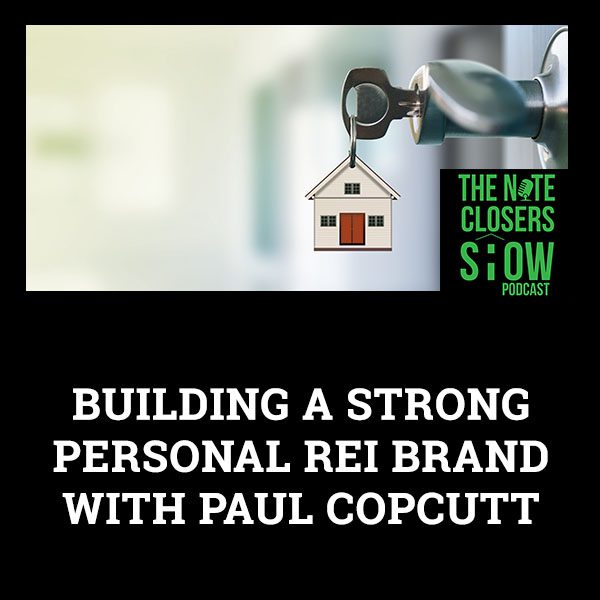
A strong real estate investing business needs to have a strong personal brand, especially when you’re just starting out. The act of just being on LinkedIn and networking can go a long way for your REI brand. Join your host Scott Carson as he talks with the host of the R.E.I. Branded Podcast, Paul Copcutt, about building your personal REI brand. Discover what it takes and some of the mistakes that real estate investors make when becoming full-time entrepreneurs or investors.
—
Watch the episode here
Listen to the podcast here
Building A Strong Personal REI Brand With Paul Copcutt
This is Paul Copcutt of REI Branded Podcast. If you would want to read this episode, I’m here with Scott Carson, The Note Closers Show, and we are talking everything about branding, personal branding, and marketing in the real estate space.
—
I’m excited to be here with you. I’m jacked up to have a guy who is kicking butts and taking names. He has a passion for helping other real estate investors get their word out and market associates. He does the REI Branded Podcast. He’s the man, the myth, the legend. Mr. Paul Copcutt is joining us. What’s going on, Paul? How are you doing?
Scott, I’m good. How are you?
I’m great. Paul, I love your podcast. Why don’t you share with our audience out there because we’ve got a variety of real estate investors and people looking to get into real estate? Talk a bit about your podcast but let’s also talk a bit about your mindset and what you focus on working with other people.
The REI Branded Podcast is for real estate investors or other professionals associated with real estate investing and helping them get noticed because I find a lot of people are invisible. First of all, get them noticed and then, hopefully, get them involved in business, either hired or they find investors. There are a lot of real estate investors running around and trying to find private money, then they get referrals and build their reputation. That’s the intention.
I have guests on there that people like yourself that have built a personal brand, niche, focus on a particular area, and help people understand that if you try to be something to everybody, then you are nothing to anyone. That’s the intention of the podcast. What I do in my coaching consulting business is help those people do exactly that, understand what it is that makes them unique, and how do they stand out because there are a lot of people running around all saying they do the same thing. What makes you different and special? What we are trying to do is get that essence, and how do we get that message out there consistently.
That’s one of the most frustrating things. We deal with a lot of people that want to be investors and work in a regular career or a job, something that they are into. It’s different than real estate. Them coming into the investor side of things have the hardest time of understanding that they have to share what they are doing, get the word out, market, and brand themselves. That drives me bonkers. I’m sure it drives you like crazy when you are talking with people.
A lot of people who are in real estate investing, initially, are probably doing it on the side. They’ve got a corporate job going on because that’s where the money first comes to help them get those first 1, 2, 3 properties. They may have promoted themselves in a corporate job but the chances are most people don’t because I used to do a lot of work in the career space. I didn’t find people shouting about their successes or strengths enough. You are transferring them into an entrepreneurial place where you’ve got to do that. There’s no, ifs, buts or maybes. It’s either you do it or you disappear. That’s the thing.
What do you see in this crazy world of Facebook, TikTok, Twitter, and Instagram? I’m sure you get this question a lot, but especially for real estate investors, what do you see as being the biggest bang for the buck or the places that they need to spend the most amount of time on? Maybe starting and things maybe they are not utilizing.
It goes back to that corporate background. The chances are they’ve already got a LinkedIn profile. Why not start there? The other danger I see with social media are two things. One is people think social media has the be-all and end-all. No, it isn’t. I started in Classified newspaper advertising. That was my second job out of school. Social media is the modern-day version of Classified advertising to a degree, and we are seeing that with Facebook and Instagram. It is almost a pay-to-play environment if you want to get noticed. LinkedIn, you’ve still got that free availability. You don’t have to pay.
LinkedIn Advertising is horrendously expensive, and it’s not the way to go if you spend time authentically building relationships on LinkedIn. You’ve got something in common with people because the chances are you are reaching out to people who have spare money but you are looking for them to invest. Maybe it’s coming from their pensions, something like that or they’ve got additional funds. If they have a corporate background, why not reach out to them?
There’s a client I’m working with, and she’s a real estate investor. She used to work in the oil and gas industry. I said, “There’s your target market. Hit everybody in the oil and gas industry.” We went on LinkedIn. I said, “What was the company you used to work for?” We hit the company she used to work for. There are 1,700 people within her province in Canada. I said, “There are 1,700 leads. Next, school, university. Which university did you go to? Which years were you there?” Here are seven and a half thousand people who went in those same four years as you, and they are still in Canada. These are your next leads. That will keep you busy for the next years.
That’s the thing. There are so many people out there, and it’s taking those steps to look. Many people get overwhelmed, and we all know a confused mind is a mind that doesn’t take any action. That’s what I do love about LinkedIn. It’s one of our favorite spots but it is the easiest place. Go find somebody you went to school with, people with the same type of work or work for the company as well that have pensions. If you are making good money, there are other people there. If you are looking for outside income, outside investments or outside help with retirement, I guarantee other people I will start doing it.
We looked at the company one, drilled that down and said, “Who are the people most likely to have disposable income to invest?” It’s probably VP and above. That’s the beauty of LinkedIn. You can’t do this on Facebook, Instagram, TikTok or anything else. With LinkedIn, you can go right down to VP, title, company or school. Most of it is free to do that searching. That’s the other thing. It doesn’t cost you money to do this.
What’s the next step for most people? Should they reach out with one of those annoying, long emails like, “Let’s sign up for my stuff. Let’s do this?” Do you have a three-step or an approach to building those genuine relationships online?
The first thing I always recommend is to reach out and connect genuinely. Usually, I find a lot of real estate investors want to stay local, at least initially. When they are trying to build that portfolio, go from those 3 to 5 houses to maybe 10 or more where they are trying to stay local. Put yourself out there as the expert locally. Talk about it in that invite message. I always recommend putting something personal in the PS, which is, “I always love to hear back great new places in X city. Let me know if you know of any new restaurants, stores or whatever it is.”
Once they are connected, step two is to send a thank you message. Do not pitch, send or attach anything. Send a thank you message back and say, “My favorite place is this. Looking forward to staying in touch.” A couple of weeks later, then go into, “Would something like this be of interest?” If not, no worries. Nothing attached, no links, nothing like that. It’s very casual and slowly drops away because, in the adage in sales, it used to be you have touched somebody seven times to get a sale. LinkedIn messaging, why should it be any different?

REI Brand: If you try to be something to everybody, then you’re nothing to anyone. Stand out and be unique.
It was 80% of sales happen after the 5th contact of some sort or the 5th time you have seen it. How important is it besides that connection aspect and then looking at seeing what those folks are posting, sharing, liking or commenting? I found something. I read an article. He told me that only 3% of LinkedIn users post regularly for the most part. I was blown away by that. It’s crazy how little that’s being taken advantage of.
It’s probably the opposite in terms of Facebook.
You are not seeing it, though, because Uncle Mark is heightened by everybody.
Don’t only do the like. Spend the time and add an extra comment. Don’t only say, “Great for you,” or something like that. Make it meaningful. Make it like you are caring, that they have said or posted something but don’t only do it for the sake of it. It’s going to look false and inauthentic. It’s not going to look genuine. That’s one.
With posting, people get overwhelmed if you say post daily because the chances are, they have never posted anything in their life before getting on there or they have been on there for five years and never posted anything. I normally say 2 to 3 times a week but it could be a combo of something personal or business-related. It could be sharing some useful resource, pointing to people somewhere else.
You don’t always get the traction on LinkedIn. Pretty much every social media network clamp you down if you are putting extra on the links. Things like video are a great way to make the connection. LinkedIn was late to the party with that but 3%, you’ve got a pretty good chance your video is going to get at least seen.
That was the number one thing with COVID. We’ve always got stuck in Zoom but with LinkedIn, we are not opening up the live aspect of things and being very tight grip on the beta aspect of it but they missed out. A lot of people utilize that for their meetings because they have suffered from screen exhaustion. There have probably been more eyeglass prescriptions written in the last years.
That’s the thing. I’m a big believer, and there are the stats to back it up, that video is the way that you’ve got to share your message or get people to understand who you are and help build rapport. If you can’t meet in person, you’ve got to do something, so they can see if they identify. I’m not everybody’s cup of tea. I’m fine not being everybody’s cup of tea but those do, I do well with.
The other one I see those getting good traction is polls. That’s getting a lot of likes and views. People must understand that somebody was scrolling past your post counts as a view. Don’t get excited when your numbers jump up. The nice thing with the poll is we’ve all got an opinion. People like to jump in and give their $0.2 worth. That’s why polls get good traction.
Polls do good, and it’s a great way to keep it. Maybe some of the extremists, the leftist or the rightest, the people that like to shake it up a little bit. God knows we’ve got enough negative people out there but a great poll is a great way to see what people’s opinions are, and people may interact a little bit more than identifying who voted what or said what. Maybe not another way to filter through your connections but another way to identify opportunities.
They have opened up to everybody, at least it seems so because I keep getting them in my inbox. “Sign up for my newsletter via LinkedIn.” I’m not sure about those. I haven’t tried and signed up for any. I don’t need another newsletter.
Don’t we all need another newsletter that we don’t read it? They say email is still a very powerful tool to market with people. What are you talking, teaching or helping your clients? How much time should they spend there? How much should they send out? What should the length be? We all know that the power of the shorter email is gaining traction versus long sales letters.
I can’t remember what’s the resource but you have a live link in the first third of the email. It gets picked up by Google and puts in Spam much more regularly. You don’t want to have a live web link initially in that email somewhere down the bottom. Keep it simple. Always have a call to action. You see it from people like Chris Brogan as an example. He always says in his Sunday email, “I’m drinking a cup of some crazy tea.” He always asks the question, “What are you drinking? Let me know.” That’s a call to action. What you are trying to do is engage.
You are trying to get people to be used to taking action so that when you send something that’s more business-related, and you want them to do something in terms of investing with you, whatever it is or inquire about something, then they are much more likely to do it because they have built that trust with you that when you ask them to do something, you respond.
Gary Vee said the Jab, Jab, Jab, Right Hook aspect of things. “What are you drinking? I want to hear from you. What’s your favorite poison? What’s going on? What are you doing for the holidays?” You’ve got to communicate with your audience on some sort of fashion weekly. The daily emails get spammed out or go to the junk mail. Once a week, touch a base.
We have been doing a Note Night in America webinars almost every Monday night for years. It’s such a great way to touch base with an audience but it’s all an email. I’ve got to send out 1 or 2 emails the day or the week before to get people on it. It’s a little, “Here’s what we are talking about tonight, one call to action.” That repetitive has built trust over the years with people.
Some people are reluctant to put the personal touch in there. I will give you a great example. We had the chance to go up and close up the cottage for the year, so this is the last visit. Canadian weather, as it is, you never predict what’s going to happen. What do we get? We get hail on Saturday and snow on Sunday but no internet as well. Internet was cut for 48 hours.

REI Brand: Most real estate investors want to stay local at least initially. So put yourself out there as the expert locally.
What happened was that I normally get my Sunday note out to people. I couldn’t get it out there. I sent the note on Monday saying, “Life happens.” The response was incredible that people will come back and say, “I wish I could do without the internet for 48 hours. I would be so happy.” I had nothing to say business-wise or anything. I said, “I’m still trying to be consistent. I’m out there every week but this is the reason I was 24 hours late.” It got a better response than you sent a normal email.
The best analogy I heard is when you are looking at your activity on LinkedIn or wherever it’s going to be and get an email list, Michael Hyatt said it. “If you view your website as your home country and treat all the social media networks as your embassies, it gives people a flavor for your country but what you want them to do is visit.” You get them into the website, then get them on an email list. The email is still by far the bang for your buck in terms of money, resources and time. It’s still the best value.
With the different social media things, people always ask me, “Why are you doing this?” I know because my audience isn’t there. There might be some there but we only have so many times and hours in the day. We’ve got to focus on where our audience is at for the most part. Email is at one spot, and then LinkedIn is number one. We love the podcast. Podcast in the few years becomes such a big thing out there. Did you get any people emailing you like Sunday night, “Where are you? Are you okay?” When you miss an episode and release an episode, people are like, “Are you okay? Did you die? Did something happen?”
Maybe they are getting a ratchet on Monday waiting for giving you a 24-hour thing on that there for you. We talk a little about branding and the consistency of marketing regularly. Many people don’t know how to brand their stuff. One of the things I always like to say is, “If you are doing something once a week, make it a systematic marketing approach to things.” We can always send an email out. You’ve got the holidays coming up, “Happy Thanksgiving. Merry Christmas. Happy New Year’s.” Valentine’s day is February. That’s a good at least once a month promotional. What do you recommend for folks to fill in the rest?
You can get those calendars. It amazes me that there’s a National Day for everything. That could be a little bit different. Humor as part of your brand is a great way to pick a different message each time. You could pick other things, case studies and testimonials. It’s not in their face but it’s showing people that you are competent. You’ve got skills. You are good at what you do. You deliver on what you say you are going to do. The other thing would be to collect. Sometimes I will see something and think, “That might be a blog post.” I quickly pull out my phone and snap a picture. Maybe it will be. Maybe it won’t be.
The cottage was another good example. We had some trees come down and cut them all up, put them all up in a nice pile of logs. It was very meditative. I snapped a picture and thought, “Wow.” You need to have thinking time in your business. Take a moment. Go stacks and logs. People liked it. You are relating everyday stories and relating them back to what you do, real estate investing or whatever it is you do.
That’s such a great counsel there is. Share the personal, what you are going through, and a lot of things. That’s the problem with Facebook, Instagram and things. Everything was supposed to be so rosy. It’s like that whole Matrix complex. Wherein the movie, The Matrix is like the 8th version of The Matrix. Why did the other fail because it was so perfect? Nobody believed it. That’s the same thing when it comes to marketing. You’ve got to share the good, bad, “I’m having an off day,” or something simple versus, “Buy my stuff or sign up for my stuff.” Something to laugh at yourself sometimes is the easiest thing or poking fun at yourself to give people a little bit of chance. “He made fun of himself so that we can make fun of him.” They are okay with it.
In terms of brand, people do struggle with getting clear of what their brand is about and what they stand for. Value is a great foundation exercise to do in terms of your brand. Passion is the other. I always ask the question to people, “You win the Max Lotto Ball or whatever it is tomorrow. What are you going to do?” It’s amazing how many people haven’t thought about that. They said, “That’s all taken care of. I go, “Do this. What about the next week or the next month? What would you do then?” You can start to dig into people’s true passions. “That means I could do that.” Why don’t you share your passion for X as part of your brand messaging? There will be other people out there that find that interesting.
It’s another connection point versus if you work with them or if your age, group or school, stuff like that, the personal relationship builds the fibers for strong relationships in a lot of cases. You have been doing the branding aspect of personal branding for years. What would you say is the biggest mistake you have ever seen somebody or a couple of people make when it comes to branding? Elon Musk is smoking weed on Joe Rogan. If you look at it, there’s the dollar value but that’s the dropping in a day. For him, that’s his personality. Who gives a crap?
That’s part of his brand. Probably two things. One is the things that you are naturally good at, you underestimate. It’s something that I use with the clients. We use a personal brand assessment. It’s a 360. It’s not a corporate 360, though. It’s an opportunity for people to go and get feedback from other people as to their perception of your brand. What words would they use to describe you? What skills do they think you have? One of the other questions is, “What’s your greatest strength and why?” When I run through the results with clients, 9 times out of 10, 99 times out of 100, I say, “People see this as your number one strength.” The reaction is, “I do that all the time.”
You don’t communicate it. People know it, and they value it but you are not putting it out there to other people that might be interested in that strength. People underestimate the value of what they already do. They are always trying to improve that weakness. It was Marcus Buckingham, the StrengthsFinder guy who said, “You are only going a weakness to the point of mediocrity. You will never make it a strength. Why put all that energy into that when you could find other ways to get that weakness dealt with?”
You can at least minimize it or minimize the impact on your brand but strength. If you double down on your strengths, then you’ve got it made. That’s one. The other is everybody is trying to be everything to everyone. It dilutes things. People get confused. “Is he this or that? Does she do that?” That’s it. The brain is switching off. Go somewhere else. Find somebody else that has a clearer message.
That’s a common thing in real estate. Real estate investors are trying to be a Jack of all trades. “I do this and this.” We have all gotten those business cards at meetings where they flip it over and get twelve different things they do. I’m like, “This means you are not good at any one of these.” I can’t think of that but you need to know one thing and focus on one thing. Master that before you add a second focus.
Think of the people you refer, and somebody says, “Do you know somebody that does this?” “I know somebody who does that because that’s all he does or she does this and this but she’s good at that.” If that’s how you refer people, then people are doing the same for you.
Going back to the first point about focusing on your strengths and trying to either delegate them, what are some of the best ways you are helping your clients delegate duties or marketing that they may not be good at? Are there some tips for doing that?
As a personal brand strategist, I don’t always follow the best advice. I did not for years. I counsel my clients on, “Get help. Hire a VA. Whatever else,” but did I do it myself? No. I will be honest. That one thing completely changed my business. It was timed around COVID and you think, “Maybe you’ve got more time to do stuff.” I had a team of part-time VAs but then my VA company came to me and said, “You should take a full-time VA.” I said, “I can’t fill eight hours.” They said, “How many hours are you working yourself?” It was a great coaching question. I said, “10, 12.” She said, “Half of that.”
Everything that you do at least three times the same, you should not be doing unless that is your unique skill that brings in revenue. I did that, and what a difference. Not only changed the business but changed the way I operate and the way I look forward to doing things outside of work because I can. I think, “We are okay. I can take an hour there or an afternoon off.” Before, you would be thinking, “I’m not quite sure.” The advice on that as well is to do it before you need it. Hire somebody as a VA, and then figure out how you are going to fill their time.

REI Brand: In branding, you have to find everyday stories and relate them back to what you do.
Not sit there, trying to figure out all the tasks and everything you are going to give them ahead of time because you will never get to that point. You are going to end up being busy doing it yourself all the time. Don’t second guess because they are going to be three times slower than you can do it initially. Let it go. Let them do it. Don’t lose sleep over it. It’s a little bit of a learning process but that’s the biggest difference. All my clients end up hiring a VA to some degree.
If you want to make $100,000, hire somebody. They will do all the stuff that’s below your hourly income level. They will do the things that you don’t need to be doing that you are wasting your time and delegating. Starting part-time with somebody 20 hours a week, that’s 4 to 5 hours a day. That’s a lot of stuff that we get tied down with contracts, evaluations or due diligence in the real estate space. Show somebody how to do it once, record it via Zoom or video. It’s one of the most valuable. You’ve got to train them, and they are not psychic. You’ve got to communicate with them.
I have seen some of the big names out there with people I know. They were like, “Do it all yourself.” I was like, “You can’t do it all yourself. You will burn out eventually. It’s a whole. You are leaving a lot of money on the table. Take what you are making on an annual basis and double life because you could clone somebody to do all this stuff that you don’t want to do for the most part.” What’s the most interesting that you have outsourced? I think of the movie with the Multiplicity, where the guy outsourced the work guy, the love guy, and then the homemaker guy.
I have had clients do that. We’ve got one client, and she outsources all her meals. A chef turns up once a week. Cooks all the meals for the week. Sticks them in the fridge. Labeled, Monday, Tuesday, Wednesday, Thursday. That’s not her. She doesn’t like cooking. It’s not what she enjoys doing. She figures, “I will outsource it. Why not?”
Especially if it’s something you dislike doing, somebody is probably going to make a better and healthier meal for you. He spends a couple of hours cooking and saves you 1 hour to 2 hours a night. That’s exponential greatness. Especially if it’s cheaper than takeout or at the same cost to take out, at least on a meal basis, it’s healthier and better for you. That’s awesome. What do you see with marketing and being such a chaotic thing that’s constantly changing, especially with so much going on in the upheaval of Facebook and people talking about getting off that platform or trying to find the things? What are you doing to prepare for 2022?
I have heard some great descriptions about podcasts, the fact how it is personal because you are right in the ears of somebody. You are right there. It’s almost like having a conversation with them or it’s as close as you will have to a conversation without meeting the person. That has a lot of power and value for people. Are there other things that are going to come along in audio? Possibly. What I love about listening to podcasts is I can be doing something else.
It’s interesting you brought up the whole thing of other things talking about replacing podcasts. Clubhouse is a great example. Everybody was all excited about it at first and thought it was great but then it has taken off the deep end. I used to spend quite a bit of time there. I didn’t spend any time on there at all because it was a lot of the same people regurgitating the same thing. It wasn’t the same thing as being able to put a class or episodes together. You could say cloning our brains is with what a lot of us are doing, with our podcast sharing our inner thoughts a lot of times.
The other big thing is a lot of us have tried to control and have our community. All those are trying to get people away from the big networks. The biggest challenge is that it’s a habit to go to Facebook seventeen times a day, at least for some people. It’s even a habit with LinkedIn. You don’t have to be there every day. If you could be there 3, 4, 5 times a week, you will get pretty proficient and noticed pretty quickly. Why go through all the angst of trying to create your community when most people will default to one of the big ones? Doubling down on 2022. Eventually, you will get people back to your website, signing up and exchanging their email for something that you are giving them.
You will get that connection eventually but use your resources and time wisely in terms of marketing yourself and getting out there. Go hang out where everybody else has already hung out. Those have already been created. That may mean Facebook. That takes a little bit of discipline to stop yourself from going down a rabbit hole for half an hour because you suddenly saw a video and a post, then something else.
I was cracking up at people. I get it. People like to follow. They are playing video games, and then everybody is watching somebody play video games for hours and hours on end. Maybe it’s a different generation and things here but for the most part, you have no time. You are too busy following. How are you getting anything done being productive? I don’t think you see productive people doing it first and foremost for the most part.
My youngest will sit and watch somebody else playing a video game. If you think about sport, that’s what we do.
I can get it if somebody has got a soccer match on or they are playing a football game but driving a farm or a tractor. That was the thing that showed up in the Facebook feed. They’ve got 2,000 people like, “I’m doing something wrong.” Watching Scott type an email or record a video.
It has been done. Gary Vaynerchuk has two videographers following him all the time filming what he does. It’s probably not what everybody wants to watch but he was early in that.
It was always given good stuff. I make the joke that, for me, to be successful, I had to stop watching Gary Vee because I would spend an hour every morning watching the Gary Vee Show. I’m like, “I’m wasting my morning.” He’s saying the same twelve things every time in a different way for the most part. He’s the first one that will tell you that, “Turn me off if you want to go be successful.” Talk about your clients. Who are your main clients for you, Paul? Are they somebody who’s brand new what they are doing, been doing what they have been doing as an entrepreneur for a little while, and get their hustle on? What’s the ideal client that you work with?
Typically, the clients I work with have been in real estate investing for a while. They may still be working full-time but they are thinking about getting out of the 9:00 to 5:00, how they are going to do that, and let real estate investing do that for them. They may have reached the limit in terms of A lenders, certain banks here in Canada, 5 houses, and 7 houses. If you are lucky, then you are maxed out. It’s into the private money, B lenders. They then realize that they perhaps need a message or something to present that says, “This is who I am. This is what I have been able to do.” They are professionals outside of that realtors but tend to be still real estate investors as well.
People need some workaround, clarity around their message, how do they differentiate themselves. Some have gone a little bit beyond that. 1 or 2 of my clients do coaching of other real estate investors. Typically, what happens is they build a reputation and visibility, then somebody says, “Could you teach me what you are doing? What’s a coaching program? How do I pull a coaching program together?” We help them with that. I have a client that I have been working with for years. When we initially started, they didn’t even have a business card. Interestingly though, they had quite a good podcast and were quite successful but it wasn’t consistent.
I said, “First thing’s first, you need to be consistent with this, then we can work on the website.” They didn’t have a website. Originally, they were full-time employed. In 2020, they quit the 9:00 to 5:00. We replaced all their corporate income with additional income beyond the real estate portfolio though, coaching, sponsorship, all those things. It’s helping people build a real business, real estate business, real estate investing business versus, “I’ve got 2 or 3 houses.” For some people, 2, 3, 4, 5 houses are enough. That’s all they want. I’m probably not the person that’s going to help because they don’t need to go to that next level.
There are a lot of investors that, when they get in, built a name and did good stuff. The coaching program often is the next step for them to exchange their time for their hour and knowledge versus answering questions all day. We all have dealt with askholes. You have to monetize your time, so those that can pay for your time become much more valuable.
Those are the people that ended up ultimately having some investment, and that time is valuable a lot more. Free has no value, as we all know in a lot of cases. Adding that aspect of things, what we did, we were buying debt. People tell you, “Can you show me how to do it?” I’m like, “Sure. Let’s figure it out as we go and go from there.”

REI Brand: The things that you’re so naturally good at, you underestimate.
It’s a natural progression. Those that are always looking to take their business to the next level, many entrepreneurs are out there. They want to do that and go, “What’s next? Get rock and rolling.” What’s the best way for our audiences, Paul, to reach out, connect with you, talk about working with you and see what’s in that 360-degree breakdown or that evaluation that you mentioned?
REIBranded.com is the website or PaulCopcutt.com. Connect with me on LinkedIn. That’s where I spend most of my time. I’m on Facebook and Instagram but if you messaged me, I might see it in a week if I happen to notice the red button up there because I’m trying to avoid it. Not in a bad way. It’s not just my priority.
Those two things have been bombarded with many spams, bots, and stuff like that, too. I agree. If I get a message on LinkedIn unless it’s a text to me. My phone is the best place to connect with me. Paul, this has been a pleasure visiting with you, picking the brain, and talking about marketing and real estate all in one. Those are two of my favorite passions.
It has been a pleasure, Scott. It’s a great time with you.
Folks, go out there and take some action. Look up, Paul. Connect with him on LinkedIn. Take him up. Reach out to this guy. There are a lot of people who have called themselves a brand expert but when somebody has got two decades of doing it and has been through different trends, that’s who you want to deal with. Give Paul a phone call or a LinkedIn message and get the ball rolling. If you want to take your game to the whole next level in 2022, start there and start now. We will see you all at the top.
Important Links:
- REI Branded Podcast
- Note Night in America
- Paul Copcutt
- PaulCopcutt.com
- LinkedIn – Paul Copcutt
- Facebook – Paul Copcutt
- Instagram – Paul Copcutt
- HigherBracket.ca
- BlueSteps.com
- MarketingProfs.com
About Paul Copcutt


